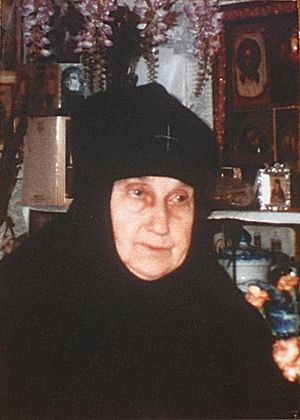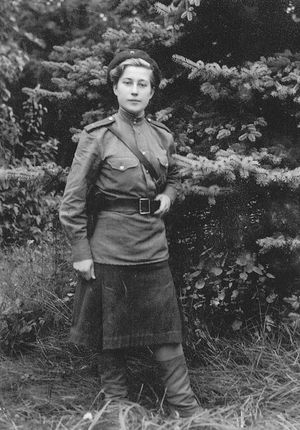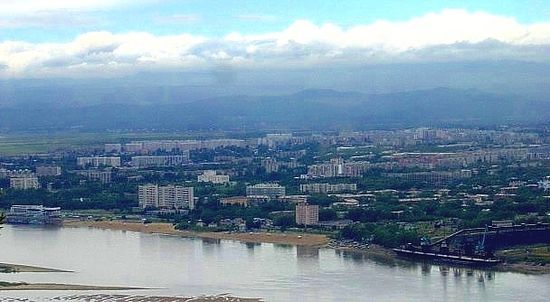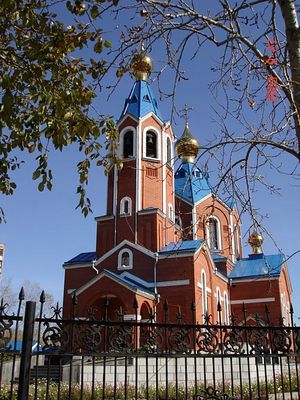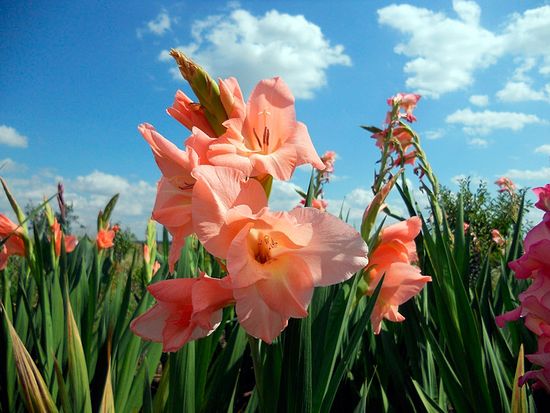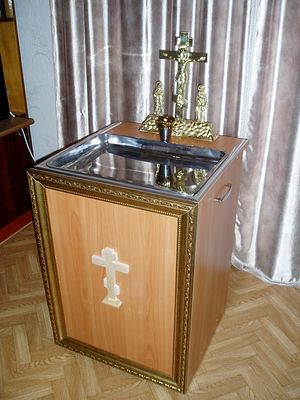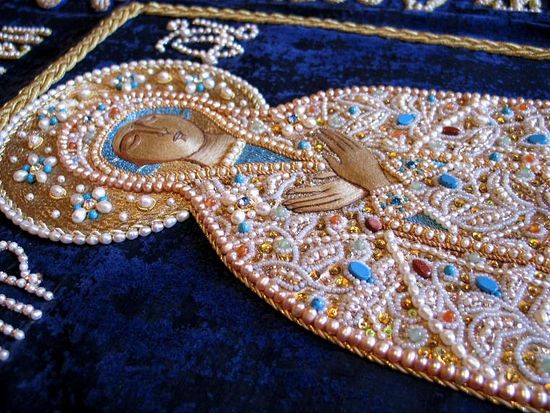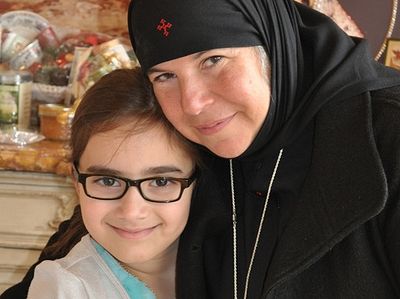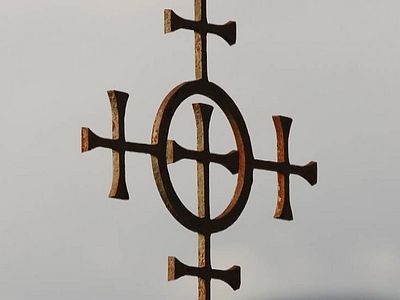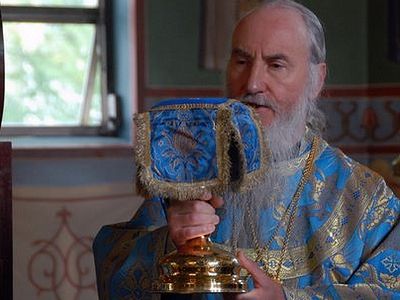Uncoincidental coincidences
The story of how remembrances of Schemanun Maria (Stetskaya) came to me could itself be the plot of a story. So much in this story of unexpected meetings turned out to be what I call “uncoincidental coincidences,” which are, in fact, manifestations of God’s providence in our lives.
The story began from a leisurely conversation one evening in a cell at the monastery hotel at Optina Pustyn. The conversation turned to modern life, and about how many elders and especially eldresses remain in Russia. In the years of atheism the continuity of eldership was disrupted, and nearly all monasteries were closed. Among women’s monasteries, only Pühtitsa remained. And how difficult it is to find a spiritual leader now! In general, the elders disappeared.
Suddenly one of the sisters gently replied:
“Don’t look there. There are elders and eldresses now, but they hide their spiritual height. You must look for an elder or eldress not in geographical space, but in the spiritual.”
“What does that mean?”
“With the help of prayer. Otherwise we can pass right by an elder and not understand that there is an elder before us. The spiritual see the natural, but the natural do not see the spiritual.”
Everyone in the cell fell silent.
And I recalled how I spent a few months in Kireyevsk, with Eldress Sepphora’s cell attendant, Schemanun Anastasia, carrying for the paralyzed matushka. Mother Anastasia told me so much about the eldress, who spent many years of her life in this small city of the Tula region. Mother Sepphora prayerfully stood at the forefront of the rebirth of Optina Pustyn and Klykovo and died in 1997 at 102 years of age. Abbots and archpriests turned to her for help and advice, and thousands of people experienced upon themselves the power of her fiery prayer, which flew like a bird to the throne of God.
But she lived quite secretly. Her prayerful asceticism was hidden. She was already a clairvoyant eldress, a schema-nun; hieromonks, abbots, and archpriests came to her, and the neighbors were bewildered: “Why do so many batiushkas come to our Baba Dasha from Optina?” You can even be an eldress’ neighbor and not know it.
The feeling arose in me, that our conversation on elders and eldresses was not over—to be continued, because nothing is accidental.
Actually, within a few days, in the same cell I met Larissa, a doctor from Kaluga, who not long after invited me to visit her in Kaluga and hear a story about an eldress of our times.
A charming, lovely woman, Natalia Ivanovna Scherbakova, told me about her spiritual mother, Schemanun Maria (Stetskaya). This eldress’ fate was amazing, and her life flowed in the stream of Divine providence. Natalia Ivanovna asked me to write about the eldress, and I myself really wanted to.
In conversation with my spiritual father, Igumen A., I lamented that I had no witnesses to the life of the eldress, except for the story of one of her spiritual daughters. It’s so little! I needed the testimonies of more people to write about the eldress.
“All is according to the will of God. If it’s God’s will to talk about the eldress, then the Lord will send people who will share their recollections of her.”
The next day, a pilgrim with whom I had stayed in the Optina hotel a year ago unexpectedly called me and asked to meet. And, suddenly:
“Olya, I’m going home to Khabarovsk tomorrow. You pray for me here, and I’ll light a candle for you there.”
“Khabarovsk? Sveta, do you have any friends in Komsomolsk-on-Amur?”
“I have one friend there.”
“I really need to find out about the eldress, Schemanun Maria Stetskaya. Can you help me?”
“I’ll try.”
With that we parted. Frankly, I thought that Svetlana would return home and forget my request: Work piles up after a trip. To my surprise and delight, I got a call a week later from Komsomolsk-on-Amur.
I received letters, scanned documents, and parcels. People remembered and loved Matushka. Then came calls from different parts of Russia: Moscow, Orel, Pskov. I didn’t even have time to be surprised. But it was something to marvel at: When the Lord doesn’t want a light to remain hidden under a bushel, all doors open.
Thus I was able to write stories about this amazing eldress of our times, Schemanun Maria. If it will be the will of God, then, perhaps sometime a book about Matushka will be written.
Childhood and adolescence
Mother Maria was born April 3, 1922 in Orel Province. After their wedding her parents were forced to separate, because her father left for work. He was delayed for some reason and did not return by the promised date. Then her mother-in-law drove her out of their home—they didn’t need an extra mouth to feed. In tears, the young woman went to church and prayed a long time, beseeching the protection of the Mother of God. When, exhausted from long prayer she sunk into the bench in the narthex, in a vivid dream she beheld a miraculous vision. The Mother of God appeared to her. The Queen of Heaven comforted her and told her that her husband would soon return home, and that they would have three daughters. She especially blessed her care for her middle daughter.
And so it happened; the middle daughter was Maria. The girl grew, and prayer became her favorite occupation. Just a babe, she would go out into forest and pray to God in solitude. Thus, from infancy the seal of election by God appeared on the child. Maria grew up and became a short but beautiful and slender girl: Blonde, with gray-blue, expressive eyes, she attracted much attention. But she maintained herself in strictness, not going to the dances with the other girls. She just loved to pray.
By the beginning of the war, Maria had graduated from the pedadogical training school. She enrolled in the reconnaissance school in Tula, and afterwards was sent to the front. She went through the whole war, which for her ended only in 1946 in Königsberg.
The narrow path
Maria got married after the war and had two children. When her children grew up, she left the world and became a nun, and then was tonsured into the schema.[1]
Monasticism is a mystery, and every tonsure is also a mystery. The soul hears the voice of God, responds, and follows God. Mother Maria spoke very little or none at all about herself, because the spiritual life is not for show. Therefore, her spiritual children learned about her life from overheard phrases, snatches of conversations, and greetings on Victory Day.
Thus her spiritual children learned of how such a miraculous phenomenon occurred in her life, as with her own mother. The Theotokos appeared to her and called her to follow her. She called her to leave the world and blessed her to build a church in honor of the Dormition of the Most Pure Theotokos in Komsomolsk-on-Amur.
For many years no one knew how a nun from central Russia wound up in the Far East. And only at the end of her life did she sparingly and guardedly mention this miraculous appearance, when her numerous spiritual children would interrogate her.
Thus, by chance they learned about Matushka’s life before her tonsure. She was so modest that they even found out about her fate on the front only in fits. For example, Natasha saw Matushka wearing warm boots in the summer heat and asked why she was dressed so warmly. Matushka reluctantly explained that her feet were frozen in a river crossing during the war and now that old cold was making itself known.
Acquaintance with Matushka
I received many letters from Komsomolsk-on-Amur, in which they spoke of Matushka sincerely and with love. Her spiritual children described how just her appearance influenced them: simplicity, silence, no exaltation, a peaceful, quiet voice… The gaze of her grey-blue eyes looked directly into your soul, it seemed.
The handmaiden of God Tatiana writes, “The first thing I saw her in appearance was her eyes. They looked at me with such love! Love poured out of them in a bright flow. And I found myself in this endless flow, a shower of love, and felt like a child, in safety, under her warm maternal protection. I was standing in a kind of blissful daze, and forgot all the questions I had prepared. And I thought, ‘Why should I ask about something—after all, everything is clear. God exists, and everything is from Him, and all things are in His will.’”
One of Matushka’s close children, Natalia Ivanovna, was working at a technical school in Komsomolsk-on-Amur as a teacher and head of the mechanical engineering department when she met the eldress. Her work situation was tense at that moment.
Natalia Ivanova began going to church and helping out in the church after services, and the church quickly became her home. Then in May 1998, on Sunday, she went to church as usual, and after the service they asked her to clean the candle stands. Suddenly she saw a crowd of people gather around some nun, all joyfully repeating, “Matushka has arrived, Matushka has arrived!” but Natalia Ivanovna did not know her. She really wanted to approach this matushka and meet her, but she had an obedience to fulfill. She walked away from the candle stands, but she couldn’t make her way through the crowd to Matushka. She returned and started cleaning the stands again. This happened a few times.
Then Natalia Ivanovna raised her head once again—and directly before her stood Maria. She looked closely and carefully, eye to eye. It was such a focused, crisp, and clear look that Natalia Ivanovna was as if electrocuted. It seemed that Matushka saw everything that is and was within her.
Smiling, Mother Maria asked where Natalia worked. Then she unexpectedly said, “Pray when you go to work.”
Then the priest led Matushka away, who repeated these words at their parting: “Don’t forget. Pray when you go to work.”
And that’s what Natalia Ivanovna did. And, miraculously, everything at work got better. The situation completely changed, and work became much more pleasant. Thus, Matushka saw all her hardships at work in spirit and helped her to cope with them.
Natalia Ivanovna became a spiritual child of Schemanun Maria and was nourished by the eldress for eight years, until her death in 2006.
An ascetic of prayer
Matushka was an ascetic of prayer. Natalia was once witness to her prayer. They were talking about something that happened, and Mother Maria, turning away, prayed for someone who had fallen into trouble. Natalia recalls that she was struck by this short prayer: Matushka addressed the Mother of God as if she were standing right there. She prayed for all her spiritual children and could feel in her spirit when something was wrong with them, and her spiritual children could feel the eldress’ prayer. Everything worked out through her prayer, and all fell into place. Matushka’s prayers helped in difficult circumstances.
Once Natalia was seriously ill. She usually had a supply of medicine, because at that time she suffered from severe sore throats, but for some reason the medicine had run out. She measured her temperature—it already exceeded 102 degrees. Getting out of bed with difficulty and staggering, she walked up to the closet and again checked the medicine box—it was empty. There weren’t even any antipyretics. She lay down on her bed again and felt how hard it was to breathe, and she began to swell. Natalia tried to pray, but everything was jumbled in her head. She remembered that her last words were addressed to her spiritual mother, and she as if slipped away somewhere.
In the morning she was awoken by the sunbeams playing on her pillow. Her head didn’t hurt; it was light; her whole body was full of vitality and strength. She was completely healthy! Natasha got dressed and went to see Matushka. As she was going up the stairs, Matushka already opened the door for her, and from the doorway: “Have you gained weight? Thank God!”
The handmaiden of God Alexandra from Komsomolsk-on-Amur told me in a letter how her mother’s chronic skin disease, which tormented her for years, went away by Matushka’s prayers, retreating the next day after the eldress’s prayers.
Alexandra also told about the severe illness and healing of her young grandson, who was lying in the isolation ward. The one-and-a-half-year-old child was in such bad condition that they decided to do a blood transfusion; shots and IVs weren’t helping. In tears, Alexandra went to see Matushka and begged her holy prayers for the child. The next day her grandson’s condition had markedly improved. They didn’t have to do the blood transfusion, the child recovered, and they released him from the hospital.
Alexandra wrote about how people appreciated the eldress’s prayers and blessings, how many healings occurred, how people found housing, how every door opened, tickets were easily purchased, and paths became prosperous.
A choir member of the Cathedral of the Kazan Icon of the Mother of God Olga Dimitrievna Grischenko wrote about how Matushka’s prayers helped her young daughter: “In June 1998 we had a daughter, Elena. When she was one month old, the eye doctor said that the tear duct was blocked in one of her eyes, and even scheduled an operation for Tuesday, to pierce the canal.”
Her daughter’s eye festered. It was very scary since her daughter was so young. I knew that Matushka Schemanun Maria from Moscow, to whom many people turned with requests, bewilderments, and problems, was in the city now. She had come to help by her prayers.
“I took my Lenochka and went to see Matushka and told her about my sick daughter. Matushka received us tenderly. She said that we must first turn to the Heavenly Doctor, and then to an earthly one. Then Matushka went silent and grew pensive. Only later did I realize that she was praying for us, sinners. Then Mother Maria said there had been a trauma during birth which pinched the tear duct. She blessed us to request a moleben to the Kazan Icon of the Mother of God with a blessing of water, and to use the water to wash her eye. That’s what we did.
When we went to the eye doctor on Tuesday, the doctor said the operation wasn’t necessary—the tear duct had opened. Thus the Lord and the Mother of God wiped away our tears by Matushka’s prayers.”
A resident of Komsomolsk-on-Amur, Martova Tamara, writes in a letter about how heavy temptations were removed by the eldress’s prayers. Tamara’s family (her husband, daughter, brother, mother, and herself) were planning to emigrate. There were two weeks left before their departure, they had already ordered their tickets, and their stuff was already packed up. But their hearts were restless—what awaited them in a strange country?
Tamara and her daughter went to church. Mother Maria was there at that time. They went up to her and shared their worries. The eldress said, “They need slaves where you’re going,” and she blessed them to stay. The heaviness immediately left their hearts, and they were very overjoyed by Matushka’s blessing. But how to turn all the events around was unclear. After all, her husband and brother wanted to leave. Tamara finally asked Matushka, “How should I make it so we don’t leave?”
And then, according to Tamara, a true miracle occurred. She was returning home with her daughter, worrying. How could she explain everything to the men? Suddenly her brother came to see them and said, “I’m not leaving yet.” And Tamara and her husband joyfully answered as with one voice, “And we’re not leaving!” So they stayed in their native land, which now they do not regret at all. Thus Tamara’s family avoided a hasty act, and now they all remember it joyfully.
Schemanun Maria’s prayers helped not only in difficult circumstances. The main thing was that she prayed for people’s salvation, and that they would come to faith, to live piously.
The eldress’s spiritual gifts
According to the recollections of her spiritual children, Mother Maria was a very modest and humble person. She was an ascetic, and, as all ascetics, ate little, normally eating just a teaspoon of very simple food. She was often sick, but tried not to take medicine. Her main medicine was Holy Communion, holy water, and prosphora.
But she didn’t call others to such an ascetical life, because she had spiritual discernment and knew who could handle how much. Thus the handmaiden of God Alexandra sent a letter with Matushka’s advice about fasting. Here’s a passage from the letter:
“In regards to food, don’t take upon yourself more than necessary, for there are many cases of great trouble after self-guided asceticism. Stick to the middle path and it will be alright; otherwise the cunning one (the enemy) will approach you, weaken your last remaining bodily strength, and you will be unable to do anything—neither prayer, nor physical work, and he will be overjoyed. Thus, my dear, inner rebirth is very important: Do not desire anything bad, and don’t even think about it.”
Matushka was meek and patient. Natalia Ivanovna recalls how once Matushka was seriously ill. Natalia went to see her. She saw on her bedside table a lamp without a lampshade. The bright light was hitting Matushka right in the eyes. Natalia gasped and started removing the bulb, but the cell attendant got upset, remembering that Matushka had meekly asked her to remove the lamp. She wanted to remove it, but got caught up in housework and forgot. And Matushka, suffering from sickness, having asked once, was silent and never complained about the bright light beating her right in the eyes. She endured silently.
Matushka was also strict. In one monastery she suddenly chastised a man who had fallen into despair and decided to leave for the world. He had revealed these tormenting thoughts to no one, and was stunned when a schemanun denounced them. Matushka scolded him, and, presumably prayed, because the demonic thoughts retreated from him. His despair left, and he joyfully repeated to all those around, “Matushka! Ahh, Matushka!”
There was such an instance: Natalia Ivanovna went to see Matushka with one of her sisters. They were walking through the train, and her sister had a rather large suitcase. Natalia suggested putting it on the top shelf together, to not bother people in the aisle. But her sister refused:
“Let it stay where it is. It’s nothing—they can go around it! I’m not going to mess around with this weight for the sake of someone else’s convenience!”
At the next stop more people got on and it became quite cramped, and her suitcase was disturbing people the whole way there.
When they arrived to the eldress, she warmly welcomed Natalia, but she looked strictly and scornfully at her companion. She didn’t understand: Why was this matushka unhappy with her?! Then Mother Maria said, “Why do you think only about yourself? Why don’t you care about others!? So Orthodox!”
Another time, after a service the eldress suddenly turned to the serving priest with a question about one of the chanters on the kliros. The priest was perplexed and answered that, actually, one of the sisters sings on the kliros, but she was at home then, preparing for exams. Then Mother Maria asked him to take her to this sister. They got in the car and left. They arrived at the girl’s place, and the eldress said she wanted to stay with her at her dacha. Everyone was, of course, in disbelief, but as they had already known Mother Maria for a long time, they didn’t ask anything, but only listened.
They arrived at the dacha, and Matushka said to them, “You all stay in the car while I go for a stroll and take a look around.”
Getting out of the car, she went to the neighbor’s yard and began walking around someone else’s garden, wandering about. Everyone sitting in the car was silent. They were waiting to see what would happen. Suddenly the door opened at the neighbor’s house and a man came out. Somewhat disheveled, several buttons of his shirt were unbuttoned. He went up to Matushka and started asking her something, somewhat angrily at first, but then he calmed down. Then they were already walking together between the beds and speaking unhurriedly, even smiling.
After a bit Matushka finished the conversation. The man accompanied her and asked her blessing. Mother Maria got in the car and, explaining nothing, said, “Now we’re going back to the church.”
No one ventured to ask the eldress anything. The days passed. Gradually we began to forget the story. Just a month later the priest recognized some man in elegant clothes as the disheveled dacha neighbor. He had come for confession:
“I want to confess a sin, Batiushka! Remember when you drove out to my place at the garden, with that wonderful matushka? I was undergoing very hard times then; I was experiencing severe despondency. I had decided to commit suicide, to hang myself. I had already climbed up to the attic and made a noose, and was about to put it around my neck, when I heard some kind of noise on my property. Some stranger was walking around. ‘Whatever,’ I thought. ‘I’ll have time to hang myself. For now, I’m going to see who’s walking around and then I’ll hang myself.’
I went outside, and there was Matushka, and I started talking with her. After our conversation, everything was good in my soul! All my sorrow had left! The sun was shining, birds were singing, and my favorite gladiolas were blooming! It was great! How could I have decided to hang myself; how could my mind have been so clouded?! I went and took the rope down. And I’m still alive. And my situation gradually changed for the better. I came to repent of trying to kill myself. Absolve this sin, Batiushka! Maybe some kind of penance…”
A story from Igumen P., the dean of the Church of the Dormition of the Most Holy Theotokos
“I want to say that I am by nature a skeptical man, so you don’t have to fear any exaggerations on my part in my assessment of the person of Matushka Maria. I will speak exclusively about that which we have heard, which we have seen with our eyes, which we have looked upon, and our hands have handled (1 Jn. 1:1).
“Perhaps I’ll begin with the story of how I met her. My first encounter with her was in the year of the millennium of the Baptism of Rus’ (1988). I was in Komsomolsk-on-Amur for it, and I found a small residence there turned into a church, in a rather lamentable state.
“At one of the next services I encouraged the parishioners to donate to renovating the building. My call did not have any special effect, whether because of the poverty of the little flock, or because people first wanted to take a closer look at the new batiushka. I must say, my predecessor left them plenty of reasons for distrusting him. And I myself, as you will see below, was far from apostolic selflessness.
“Once at Vespers I noticed an unfamiliar eldress in a dark-grey cloak and large black head scarf, wound in several layers on her head. On top of it there sat some ridiculous protruding glasses, like a pilot or fireman would use. Having slid down onto her forehead, they made quite a comical impression.
“But for me—it’s no laughing matter, because my parishioners, clearly having forgotten about prayer, surrounded this ‘pilot’ and were endlessly thrusting papers into her hands and her pockets. During the censing, I checked what it all was—commemorative lists and money. My internal indignation knew no limit: ‘What is this?!The cups are empty, the old plaster is falling on our heads, and here some vagrant dares to take the last of their money, without the rector’s blessing! And even during the service!’
“I could barely wait till the end of the Vigil, but I didn’t even have time to open my mouth, as this old woman came up to me herself with a package in her hands.
“‘Here,’ she says, ‘you serve in the Church of the Dormition of the Mother of God here… Accept this from us, Muscovites, for the glory of the Most Pure One’ (Matushka lived many years in the capital).
“I lifted up a corner of the packing and looked—blue brocade vestments that I couldn’t even have dreamed of then.
“‘No,’ I answered, ‘I will not accept them. What is this you’ve organized for me at the service here? Or don’t the priests bless you to gather donations for churches in Moscow?!’
“She bowed and left, leaving the package on the Panikhida table.
“The next day, on our patronal feast day, a meal was laid out in the yard after Liturgy, to which we invited our guests. I was sitting with our clergy at one end of the table, and she was at the other end. I was glancing at her involuntarily: She had a characteristically ascetic pale face with an olive tinge, and extraordinary eyes. Only much later did I realize, that’s how dispassion looks…
“Matushka didn’t pay any attention to me, and as it seemed to me at first she was telling her neighbors in hushed tones about visiting some parishes, and the characteristics of the pastors serving there, for instance: ‘The batiushka there is very good, just for some reason he does this or that sin, which he shouldn’t do…’ It was just one thing after another with her, and now she was even publicly judging the clergy…
“Then suddenly I got hit too—she exposed my hidden sins as well! Well, yes, I did that yesterday, and that’s about me, oh, and that too!
“After trapeza I went up to Matushka saying, ‘Forgive me, I see you’re not a simple person…’ I invited her to my cell, and we had a direct and unflattering conversation.
“It turned out that Matuska knew everything about me—even more than I knew about myself. Among other things, she asked, ‘Batiushka, why are your hands so red?’
“‘So red?’ I wondered. ‘They’re ordinary hands, as they’ve always been.’
“‘No, no, they’re red. Sure, not like one starosta who was stealing things from the church… His arms were burning all the way up to his elbows, but yours are just somewhat red. Maybe you have some problems with your documents, or you’ve spent some unnecessary money on yourself?’
“Well, of course I have sins. I didn’t just adorn the church, but used some church funds on personal necessities, for home furnishings, for comforts of the flesh…
“Basically, it’s not just my hands that should be red.
“Matushka always told me about how this church was opened by order of the Theotokos herself in the 1960s, during the Khrushchev persecutions. She had appeared to her in a dream and said, ‘There is a city, Komsomolsk-on-Amur. You should open a church there in honor of my Dormition.’
“When Matushka woke up and looked at the map, she gasped: almost 6,215 miles from Moscow! She began to doubt—was it some kind of prelest? Soon after that she became paralyzed, and the Theotokos appeared twice more, repeating, ‘Go!’ And when she decided to go—she stood on her feet.”
A story from the parishioners of the Dormition of the Most Holy Theotokos Church
The contemporary parish of the Dormition of the Most Holy Theotokos appeared in Komsomolsk-on-Amur at the end of the 1960s by the will of the Most Holy Theotokos herself. Mother Maria came to our city with her sister to fulfill the Mother of God’s order. Having arrived, they got acquainted with the believing women and would pray at one of their homes.
The Lord told them to buy a house to turn into a church, and four women, Yulia Ivanovna Begovatkina, Valentina Mitrophanovna Makarova, Evgenia Ivanovna Zhuravleva, and Maria Konstantinovna Shish, bought the house at 83A Lermontov Street with their own funds. The authorities didn’t like it, and they gathered a court of peers. But the people intervened for the believers at the court, saying, “Let the grandmas pray.”
All together they rebuilt the house as a church. They hand-copied the texts of the Divine services, Akathists, and Panikhidas. They made Church vessels from whatever material was available. Priests from Khabarovsk came to nurture the faithful, to serve and to hear confessions: Hieromonk Anatoly, Igumen Seraphim, and Archpriest Dimitry.
Mother Maria helped build the church by prayer and funds donated by believers. She regularly went to Komsomolsk-on-Amur, ministering to the Church of the Dormition and all the faithful of the city for eighteen years. People would leave Komsomolsk-on-Amur to go see her in Orel. Once, with the parish rector’s blessing, one of the four women, the future Schemanun Evlogia, having gathered money to buy a house that would become the church, went to see Matushka in Orel for the shroud of the Most Holy Theotokos.[2]
They ordered the shroud from a Church workshop. When it was ready they took it to the church to be blessed. The priest who blessed the shroud said that the Theotokos herself blessed it, and felt a strong fragrance coming from her. The shroud was carefully packed, and Mother Maria went to the station with her co-traveler, to get to Moscow by train, and from there to fly to the Far East.
The train was about to leave. Someone opened the back door of the car to them, and they entered and stood by the conductor’s compartment. The conductor was surprised to see the matushkas, but allowed them to travel. A strong fragrance was coming from the shroud. The fragrance was unbearable for some of the passengers, and they became outraged and blocked the door to the compartment, unable to endure the grace from the presence of the holy object.
In the morning they arrived to Moscow and got on a bus to the airport. The same story repeated itself there. When they arrived at the airport, it turns out, boarding had already finished, and the plane was already taxiing on the runway. The matushkas began to pray, and the plane was delayed. They asked for a bus to take them to the airplane.
When they got to the ramp, they saw the surprised faces of the passengers in all the windows. They had been expecting to see that some important persons were holding up the plane. But instead, they saw two old village women. When the matushkas entered the cabin, the fragrance again began to pour out.
The shroud was delivered to the church right on the eve of the patronal feast of the Dormition of the Most Holy Theotokos.
The last time Schemanun Maria went to Komsomolsk-on-Amur was in 2000, when she was already 78 years old. At such a venerable age, she traveled throughout the whole country to the Far East to her beloved church, to her spiritual children. Matushka reposed in 2006, at the age of 84, and was buried in the city of Orel in the Afanasievsky Cemetery, next to the women’s monastery.
